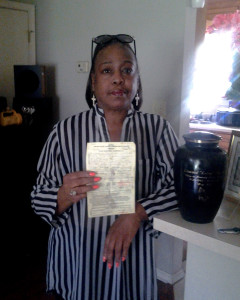SCHR Files Suit on Debtors Prison Practices by Probation Firm in South Georgia
 (APN) ATLANTA — The Southern Center for Human Rights (SCHR) has filed a civil rights lawsuit against Red Hills Community Probation on behalf of indigent people who say they have been injured by the company’s bullying and abusive business practices. Red Hills operates in the municipal courts for the cities of Bainbridge and Pelham, Georgia. Both cities are in south Georgia.
(APN) ATLANTA — The Southern Center for Human Rights (SCHR) has filed a civil rights lawsuit against Red Hills Community Probation on behalf of indigent people who say they have been injured by the company’s bullying and abusive business practices. Red Hills operates in the municipal courts for the cities of Bainbridge and Pelham, Georgia. Both cities are in south Georgia.
The lawsuit states that Red Hills Probation employees routinely demanded money from probationers and would hold them for ransom until family members came up with money for the private probation company’s fines and fees.
Others probationers, whose families cannot pay, are taken to jail for being too poor to pay.
The plaintiffs seek damages and injunctive relief, claiming that the company’s practices are unconstitutional and fraudulent.
The alleged violations include due process violations, equal protection violations in discriminating on the basis of income without a rational basis, unconstitutional seizure, false imprisonment, unlawful imprisonment for debt, and fraud.
The case was filed in the United States District Court for the Middle District of Georgia.
As previously reported by Atlanta Progressive News, the American Civil Liberties Union of Georgia recently settled a similar lawsuit involving debtors prisons in DeKalb County.
http://atlantaprogressivenews.com/2015/04/01/aclu-dekalb-county-settle-debtors-prison-case/
“What we saw in this case was private probation officers holding poor people for ransom over traffic tickets. We see a lot of cases with abusive collection tactics like the ones we complained about in this lawsuit,” Sarah Geraghty, Senior Attorney for SCHR, told APN.
“People are concerned about the fact that, in Georgia eighty percent of people on misdemeanor probation are supervised by private companies. Of course, the primary aim of a private probation company is to make money,” Geraghty said.
Below are the personal horror stories on how minor, petty infractions turned into expensive fines and jail time for ordinary people who have been criminalized by a corrupt system:
Adel Edwards went to the Pelham Municipal Court and pled guilty to burning leaves in his yard without a permit.
Mr. Edwards, who is intellectually disabled and whose only income consisted of food stamps, was placed on probation for twelve months because he could not pay his 500 dollar fine on the day of court.
With probation “supervision” costs added in, his court bill rose to 1,028 dollars. Minutes later, a Red Hills probation officer demanded an immediate payment that neither Mr. Edwards nor his family could afford to pay.
Mr. Edwards was taken to jail and held for several days until a friend paid 250 dollars to get Mr. Edwards out of jail.
After Mr. Edwards’s probation expired a year later, private probation officers instructed him to continue reporting once per week, threatening to have him jailed if he failed to report and pay as ordered.
Vera Cheeks went to the Bainbridge Municipal Court and pled guilty to failing to come to a complete stop at a stop sign.
She could not pay her 135 dollar ticket, so the municipal court placed her on probation and required her to pay supervision fees until her fine was paid.
When Ms. Cheeks met with a private probation officer minutes later, she was instructed to pay 50 dollars immediately or else she would go to jail.
Because she did not have money, Ms. Cheeks was detained in the courthouse while her fiancé left to pawn his weed trimmer and Ms. Cheeks’s engagement ring.
Fred Barber went to the Bainbridge Municipal Court and pled guilty to driving a car with a suspended registration.
He was placed on probation and met with a private probation officer, who told Mr. Barber that he would go to jail unless he immediately paid 280 dollars.
Mr. Barber did not have 280 dollars, so the private probation officer had Mr. Barber placed in an inmate holding cell inside the courthouse while Mr. Barber’s cousin left in search of someone to loan her money.
“People who are on probation and under supervision of private companies are often on probation for relatively minor offenses like minor traffic infraction or failing to come to a complete stop at a stop sign,” Geraghty said
“In cases like that, private companies have overstepped their boundaries in their efforts to make money. This kind of practice erodes people’s faith in the court system and in law enforcement. That is one of the reasons we can’t permit this kind of thing to continue, Geraghty told APN.
Georgia has the highest number of people under correctional control in the country which includes prison, jail, parole, and probation.
https://www.schr.org/files/post/Privatization%20Report%20FINAL.pdf
http://www.hrw.org/reports/2014/02/05/profiting-probation-0
The lawsuit claims that local law enforcement officials are liable for knowingly assisting the company’s employees in violating the plaintiffs’ rights.
(END/2015)
We are recommeding that interested readers get in touch with Spith West Georgia Project in Albany. They are an outgrowth of the SNCC in the 1960’s and have an office in Alabany a small city in the Southwest near Plains and 1-75. They are working on a number of issues and have a track record that is impressive.Most of the citizens are Caucasian near there, many about 40% are African-Americans and bout 6% arearrivals mainly from states in Mexico. The Mexicans are sometimes on a H-2A visa but often not. Most are men between the 20’s and 40’s and are seasonal.